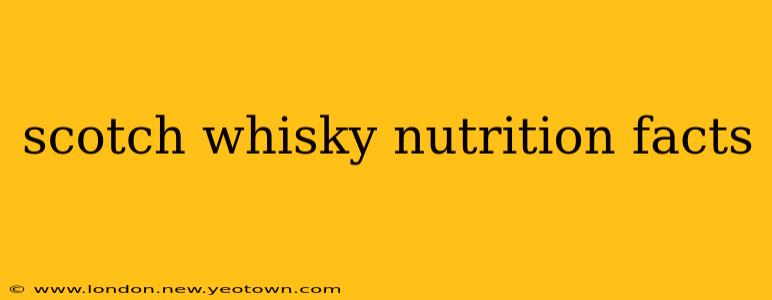Unpacking the Dram: A Look at Scotch Whisky Nutrition Facts
The amber liquid gleams in the glass, the aroma fills the air – Scotch whisky, a drink steeped in history and tradition. But beyond the rich taste and satisfying warmth, what are the actual nutrition facts behind this beloved spirit? Let's delve into the details, exploring the caloric content, potential health impacts, and answering some frequently asked questions.
Our journey starts with the core understanding: Scotch whisky, at its essence, is a distilled spirit made from fermented grain mash. This means it’s primarily composed of alcohol, with minimal amounts of other components. This simplicity is reflected in its nutritional profile.
How many calories are in a shot of scotch?
A typical shot of Scotch whisky (around 1.5 ounces or 44ml) contains approximately 97 calories. This caloric count can vary slightly depending on the brand and the alcohol percentage, but it generally falls within a small range. Remember, these calories are primarily from the alcohol itself; there's minimal contribution from carbohydrates, fats, or proteins.
Does scotch have any carbs?
The short answer is very few, if any. Scotch whisky, undergoing distillation, largely removes the carbohydrates present in the original grain mash. While trace amounts might exist, they're insignificant in terms of nutritional value. This makes Scotch whisky a suitable choice for those following low-carbohydrate diets, but moderation remains key.
Is scotch whisky good for you?
This question is tricky and requires a nuanced answer. There's no evidence suggesting Scotch whisky directly offers health benefits. However, some studies indicate potential moderate benefits linked to the antioxidants present in certain types of Scotch. These benefits are far outweighed by the risks associated with excessive alcohol consumption. Therefore, it's crucial to emphasize that moderate, responsible consumption is key. Excessive drinking can lead to a host of health issues, including liver damage, heart problems, and increased risk of certain cancers.
Does scotch whisky contain sugar?
Scotch whisky contains virtually no added sugar. The sweetness perceived in some varieties comes from the natural sugars present in the barley and the aging process within oak barrels. This natural sweetness is typically subtle and contributes to the overall flavor profile rather than adding significant sugar content.
What are the main ingredients in scotch whisky?
The main ingredients are remarkably simple: water, malted barley (or other grains), and yeast. The water source plays a significant role in the flavor of the final product, and the type of barley and yeast strains used contributes to the uniqueness of different Scotch whiskies. The aging process in oak barrels introduces additional flavor complexities.
Is scotch whisky gluten-free?
Generally, yes, Scotch whisky made from malted barley is considered gluten-free. The distillation process removes most of the gluten. However, it’s always wise to check the labeling and, if you have a severe gluten intolerance, to consult your doctor before consuming even a certified gluten-free version.
Disclaimer: This information is for educational purposes only and shouldn’t be taken as medical advice. Always consult a healthcare professional before making significant dietary changes or if you have any concerns about alcohol consumption. Responsible drinking is essential for maintaining good health. Remember, moderation is key to enjoying Scotch whisky safely and responsibly.

